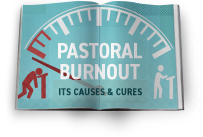Pastoring Amid Depression
I don’t remember all the details of the conversation. My wife and I were sitting together. It was the evening time. We had this corner in our apartment that we called “the nook.” It was between the dining room and the kitchen and it had enough space to fit two arm chairs, a table between them, with a lamp. We spent a lot of time in that nook together, with many conversations. This one stands out to me because it was the first meaningful conversation we had about my sadness.
My wife mentioned noticing some emotional disconnect in me. I was attempting to explain it like when you fall asleep on your arm funny and it falls asleep. You sit up and you try to reach for a glass of water with that arm. You look at the glass and you look at your arm, but as much as you want to reach out, there’s a disconnect with your intention to reach out and your arm’s ability to actually do it. That’s how I had felt in my emotional life. I had wanted to connect and reach out emotionally, but something inside me was asleep or disconnected. Something had changed.
It wasn’t surprising to my wife that I had been sad. There was challenging circumstances at church. There was conflict, confusion, and for the first real time in my life, I had experienced being slandered and lied about, where I had lost my reputation with people that I cared for. I was exhausted. I was regularly in meetings until midnight, trying to work through really tough, relational dynamics. I lost a lot of confidence in myself. I didn’t know which way was up and which way was down during much of that season. It lasted about 18 months.
But I began to notice that I wasn’t just sad or discouraged about my circumstances. Something was different. There was a darkness that had set in. My sorrow and discouragement began to wrap around me and squeeze. It was hard to not experience my entire reality (my family, work, rest, prayers) through the filter of sadness and sorrow. “The flesh can bear only a certain number of wounds and no more,” says Charles Spurgeon, “but the soul can bleed in ten thousand ways, and die over and over again each hour.” [1] In other words, while depression may have been triggered by circumstances, it wasn’t just discouraging circumstances that kept me low.
Depression was something that I had never experienced. I had always had the ability to see around the corner; to speak truth into circumstances and trust either in God or, sinfully, in myself to make it through. But now it was as if I had emotional blinders on that didn’t allow me to see or feel much of anything else but my sorrow. My inner life seemed to reject a word of encouragement like a body that vomits up medicine. I could hold on to hope like I could hold on to smoke with my hands.
But the more I had opened up and talked about it, the more I heard from other pastors and colleagues that they had never experienced depression until they went into pastoral ministry or engaged some significant conflict or discouragement in their work. I wasn’t alone. What was remarkable was that while words of truth and encouragement often felt as effective as cough syrup for throat cancer, the abiding presence of a fellow sufferer was like the hand of God over my wounds. It helped enlarge my scope of reality. Depression was like being in a confusing, blindingly dark cavern, but the presence of someone who could give witness to my pain was like a voice in the dark, awakening some hope that there may be some direction out.
I was a pastor and depressed. Of course, depression doesn’t just hit pastors and not all pastors will experience depression. But there were some unique challenges to being a spiritual leader and guide, while also feeling weakened by my emotional life that I didn’t have many categories for. How could I help others if I felt helpless? How could I preach the fruit of Christian joy when it had literally been months since I had experienced it myself? Shame, guilt, and fear seemed to be taking their turns swinging at me.
IT’S NOT ABNORMAL TO BE SAD
Here’s the honest truth: Good pastors put themselves in the way of potential criticism and regularly within the realm and reach of other people’s pain. It should not then surprise you, pastor, that you may experience depression even though you’ve never experienced it before. Carrying the consistent emotional weight of the various pains, fears, criticisms, suffering, and transitions of a congregation (big or small) is a challenging vocation. What it can do to your inner life can or will surprise you. But while it can surprise you, know that it’s not abnormal. Apart from the pastoral weight, sadness is a normal Christian experience. “The Road to sorrow has been well trodden, it is the regular sheep track to heaven, and all the flock of God have had to pass along it,” says Charles Spurgeon.
I know in some circles, there are stigmas against pastors seeking out counseling, but it is a good thing, even in seasons that don’t feel like a crisis. Counseling and having someone give some direction to your inner life is a healthy pattern for spiritual leaders in every season.
Seek out help within the local church. Not everyone will be of help. Not everyone will understand, but do not be afraid to speak openly about it with your fellow elders if you have them. The local church can be ( ought to be) a gracious place for people, even leaders, to fall apart. But often times, the complexities of depression can be challenging for lay leaders. It may be wise to seek professional counseling.
FINDING LANGUAGE
In my experience, finding language and categories to use in order to talk about my depression was a great first step towards healing. There is power in naming your trouble. I don’t just mean being able to use the word “depression.” But even more, there is something about metaphors used by fellow sufferers that seemed to open up my grasp of the storm inside me. Clinical words can help in categorizing and analyzing, but metaphors seemed to make my heart go, “That’s it!”
Zack Eswine explains that metaphors sometimes help unfold the mysteries of the soul better than clinical terms because they don’t over-explain but leave room; they allow for nuance and difference; they require further thought and exploration. [2] Finding good books (Spurgeon’s Sorrow, by Zack Eswine or Lincoln’s Melancholy by Joshua Wolf Shenk) are a good help in opening up new vocabulary. But learning to find a home in the Psalms is the best medicine.
I began to realize that the Psalms were filled with words from desperate, sad, hopeless, and confused believers. They had words for me that I didn’t know I needed. What was a deeper, more surprising comfort was that they were inspired by God, who knows what men and women need to say when we don’t know what to say. God knows how desperate we can get and has provided words for us to say in those times. “Here,” he says, “use these words. They’ll help.” Yes, the Spirit groans for us when we lay wordless like a frail leaf, but the Psalms provide words, language, for when our souls need to reach for expression. “My soul melts away for sorrow.” Psalm 119:28; “I am worn out from my groaning.” Psalm 6:6. “My life is consumed by anguish and my years by groaning; my strength fails because of my affliction, and my bones grow weak.” Psalm 31:10. “Let not the deep swallow me up.” Psalm 69:15. “For my soul is full of troubles … I am a man who has no strength.” Psalm 88:3.
These words can feel like emotional handle bars as we try to make sense and grapple with our experiences.
SEEK BETTER HABITS
Too many of us sleep less hours than we should and eat more than we ought. We do not exercise and we overwork. Not only does this bring bad health, it leads to being emotionally unhealthy. Some basic weapons against depression is to pick up healthy habits.
Take a regular Sabbath. Fight for a day of rest every week. Resist making justifications to skip days off. Eat healthy and exercise.It has surprising effects on your thought life. Pray the Psalms. Build healthy friendships, even though you may have to sacrifice comfort for this. Pastors often know everyone superficially and no one deeply. Turn off your phone from dinner time to breakfast time. Take regular breaks from social media. These rhythms and habits don’t cure your depression but they enhance your thought and emotional life.
After several months of depression, the cloud lifted for me. I experienced healing. Can I tell you something marvelous? The joy I experience now with friends, my spouse, my kids, my church, is somehow deeper. I’m a better pastor, I think. Folks here and there who also have experienced depression or melancholy have expressed they feel like I’m a safe person to talk to. That’s a gift. Can you believe it? The Lord somehow restored all that the locust had eaten and more. Praise the Lord! I would not have chosen to experience the darkness, but the darkness was transformed into a grace and I wouldn’t exchange it for anything.









